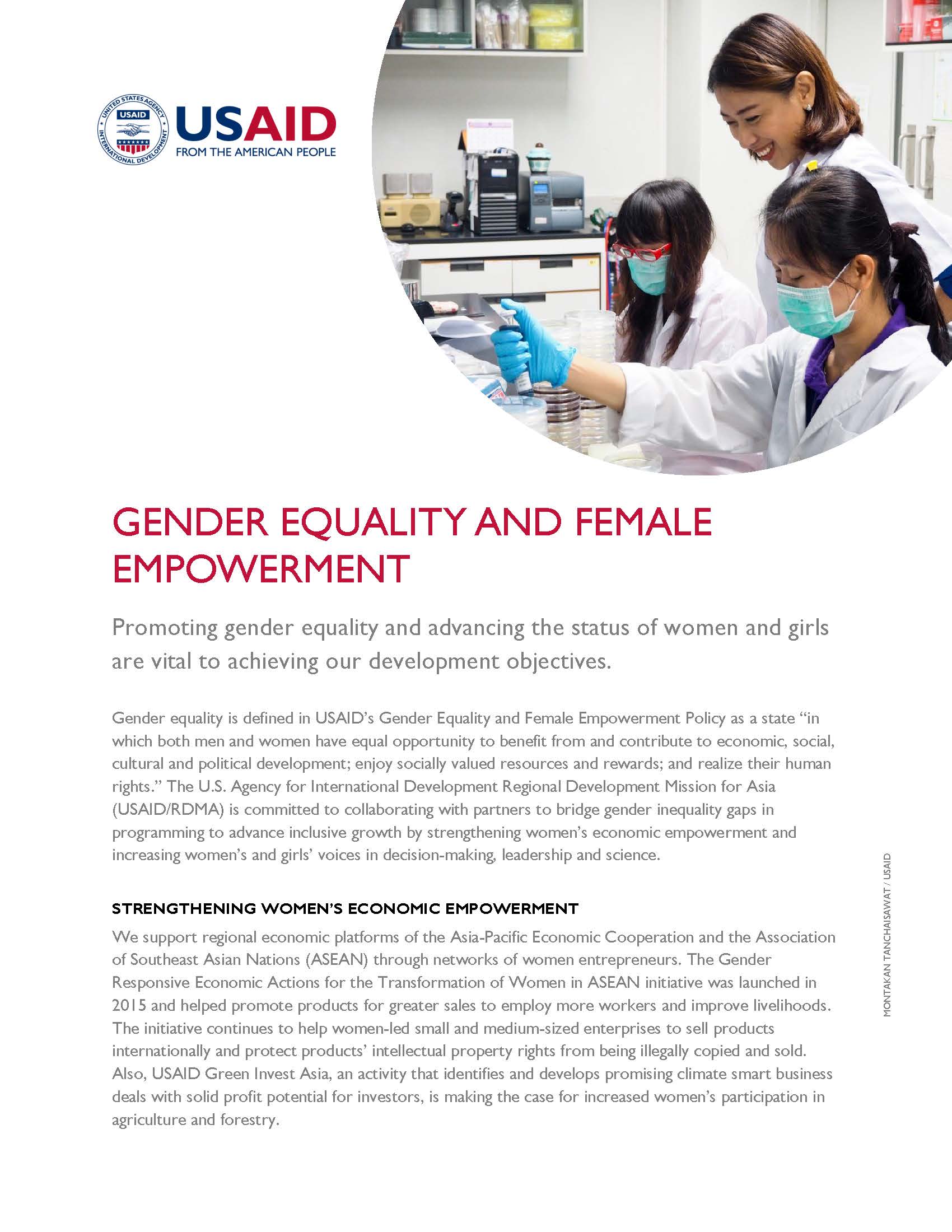Speeches Shim
Gender Equality and Female Empowerment ![]() (pdf - 293k)
(pdf - 293k)
Promoting gender equality and advancing the status of women and girls are vital to achieving our development objectives.
Gender equality is defined in USAID’s Gender Equality and Female Empowerment Policy as a state “in which both men and women have equal opportunity to benefit from and contribute to economic, social, cultural and political development; enjoy socially valued resources and rewards; and realize their human rights.” The U.S. Agency for International Development Regional Development Mission for Asia (USAID/RDMA) is committed to collaborating with partners to bridge gender inequality gaps in programming to advance inclusive growth by strengthening women’s economic empowerment and increasing women’s and girls’ voices in decision-making, leadership and science.
STRENGTHENING WOMEN'S ECONOMIC EMPOWERMENT
We support regional economic platforms of the Asia-Pacific Economic Cooperation and the Association of Southeast Asian Nations (ASEAN) through networks of women entrepreneurs. The Gender Responsive Economic Actions for the Transformation of Women in ASEAN initiative was launched in 2015 and helped promote products for greater sales to employ more workers and improve livelihoods. The initiative continues to help women-led small and medium-sized enterprises to sell products internationally and protect products’ intellectual property rights from being illegally copied and sold. Also, USAID Green Invest Asia, an activity that identifies and develops promising climate smart business deals with solid profit potential for investors, is making the case for increased women’s participation in agriculture and forestry.
GENDER EQUALITY IN SCIENCE
USAID encourages promising, early-career women scientists in the ASEAN region. The Partnerships for Enhanced Engagement in Research program helps address cultural barriers that dissuade women from research careers by supporting a network of women scientists studying the diversity, distribution and conservation of reptiles and amphibians in the Mekong, as well as the impacts of human activities on these species in Laos, Thailand and Vietnam. In addition, USAID developed an online Gender Sourcebook (http://asiapacificadapt.net/gender-sourcebook/) to ensure that gender equality and female empowerment are incorporated into large-scale climate change adaptation projects. Also, through the USAID Connecting the Mekong Through Education and Training program, young women are encouraged to pursue careers in science, technology, education and mathematics, learning skills with input from industry giants such as Cisco, Intel, Microsoft and National Instruments that will help them finish their studies with a solid chance of a landing a job where hands-on knowledge is most needed.
INTEGRATING WOMEN IN CONSERVATION
The USAID Oceans and Fisheries Partnership is a program designed to combat illegal, unregulated and unreported fishing and protect marine biodiversity in the Asia-Pacific region. In addition to conserving fisheries resources, the program addresses human welfare issues, such as gender equality and the complicated nature of the social and environmental challenges facing the fisheries sector.
PROMOTING HEALTH
USAID works to reduce child stunting in targeted areas of Laos and supports women, men, girls and boys with physical disabilities to gain free access to prosthetic, orthotics and physical therapy. USAID supports programs in Laos that promote good nutrition among women and children under two and enhance water and sanitation hygiene in vulnerable communities. The activities focus on improving maternal and child health to address high child mortality rates and malnutrition. The first 1,000 days between pregnancy and age two is a critical period for ensuring healthy child development. USAID assistance has also helped women and ethnic minorities in remote villages gain access to disability services and strengthened the referrals process through the country’s health system.
QUALITY CARE FOR SURVIVORS OF TRAFFICKING IN ASIA
USAID/RDMA partners with the International Organization for Migration on the IOM X Campaign to encourage safe migration and public action to prevent human trafficking and exploitation in the Asia Pacific region. IOM X builds the capacity of communities and organizations to develop public awareness campaigns that target those vulnerable to trafficking with messages and issues most relevant to them, such as the rights and recourse available for male fishers in Thailand who experience some of the most severe forms of exploitation and how to identify legitimate labor recruiters before accepting domestic worker positions abroad. USAID/RDMA integrates gender equality and social inclusion approach in all aspects of the activities and prioritizes interventions to minimize disparities among women, girls and marginalized groups, thus reducing their vulnerability to trafficking in persons and victimization.
CONTACT
Charles W. Lewis II, USAID/RDMA
Mission Gender and Inclusive Development Advisor, Program Development Office
Tel: +66-2-257-3137 Email: chlewis@usaid.gov
http://www.usaid.gov/asia-regional
Click here for the pdf version.


Comment
Make a general inquiry or suggest an improvement.